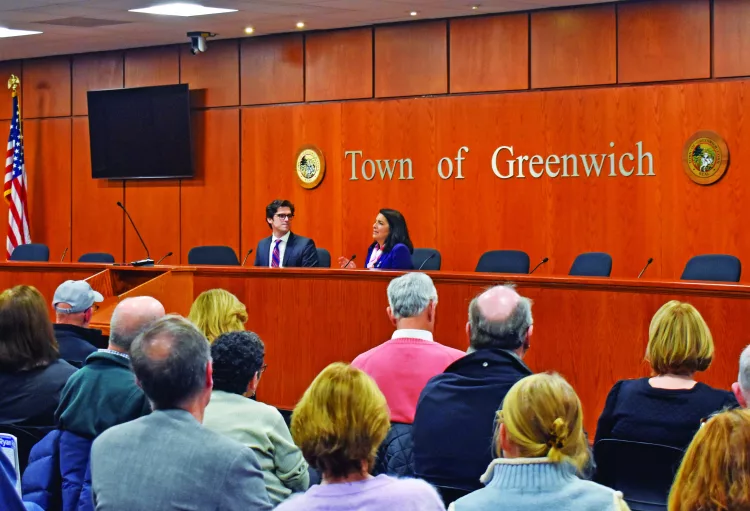
By Staff Reporters
In a legislative forum at Greenwich Town Hall, State Senator Ryan Fazio and State Representative Tina Courpas addressed a room of engaged constituents, outlining their legislative priorities and offering a critique of proposals in Hartford. The discussion ranged from state budget challenges to energy costs and zoning regulations.
Notably absent from the bipartisan exchange were state representatives Hector Arzeno and Stephen Meskers, both of whom declined invitations to participate, reportedly responding that it was too early in the legislative process for a town hall meeting. Their absence was not lost on the crowd.
“Where’s the rest of the delegation?” one resident asked.
“They were invited,” Courpas responded, confirming that both had declined.
Fiscal Guardrails and Budget Priorities
The state budget emerged as the dominant topic, with Courpas explaining the ramifications of Governor Ned Lamont’s recent proposal, which raises the volatility cap by $300 million— shifting funds from reserves into the operating budget. The change, she argued, represents a significant departure from the fiscal guard rails put in place under the 2017 bipartisan budget reforms.
“That volatility cap created our rainy-day fund,” Courpas said. “Now that the fund has grown, people are looking at it and saying, ‘Why not use it now?’ But that’s precisely the thinking that got us into budget trouble in the first place.”
The additional $300 million, Courpas noted, has been earmarked for a Universal Preschool Endowment, an initiative aimed at expanding affordable childcare and early education. However, she raised concerns about the sustainability of the program, pointing out that it is being labeled an “endowment” despite drawing down 10% annually—far above what most endowments can sustain through investment returns.
“If you’re drawing down at that rate, you’re going to have a funding hole in just a few years,” she said. “And then what? We raise taxes?”
Fazio, who serves as the ranking Republican on the Finance, Revenue, and Bonding Committee, criticized the Democratic majority’s approach to budget management, arguing that increasing long-term obligations without offsetting spending reductions will lead to tax increases.
“We have to be honest about the direction we’re headed,” Fazio said. “If we start eroding the guardrails that have kept the budget stable, we’re going to be right back in the cycle of deficits and tax hikes.”
Housing and Zoning: The Battle Over Local Control
The issue that drew the most discussion—and the sharpest responses — was affordable housing and zoning mandates.
Fazio and Courpas reiterated their opposition to Senate Bill 6831, the transit-oriented development proposal known as “Work Live Ride.” The bill, which is supported by Democratic legislative leaders, would incentivize towns to adopt zoning that allows higher-density housing near transit hubs. Towns that refuse would be deprioritized for certain state funding.
“This is coercion,” Fazio said bluntly. “It’s a top-down approach that ignores what communities are already doing to address housing needs.”
A resident pressed Fazio on Greenwich’s progress in adding affordable housing, citing data that the town has remained at roughly 5.2% compliance with the 8-30g affordable housing law for decades.
“That number doesn’t tell the whole story,” Fazio said. “In just the past five years, Greenwich has increased its affordable housing stock by about 8–10%. But the way the state calculates 8-30g units is extremely narrow. It doesn’t count naturally occurring affordable housing, which is where most of the opportunity exists.”
Both lawmakers support reforms that would allow workforce housing and accessory dwelling units (ADUs) to count toward 8-30g compliance, a change that could significantly alter how affordable housing progress is measured statewide.
“We’re not against affordable housing,” Courpas said. “We’re against Hartford dictating how we build it.”
Energy Costs and the Fight Over Public Benefits Charges
With Connecticut ranking among the states with the highest electricity rates, Fazio renewed his push for energy reform, calling for the elimination of public benefits charges—hidden fees that appear on electric bills and fund a variety of government programs.
“These charges function as a regressive tax,” Fazio said. “They make electricity more expensive for working families, seniors, and businesses while avoiding legislative scrutiny.”
One of the largest components of the public benefits charge funds a long-term contract with Millstone Nuclear Power Plant in Waterford. When pressed about the deal, Fazio acknowledged its complexity.
“The contract is above market price, but not as far above market as some of the other government mandated energy purchases,” he said. “The bigger issue is that the state keeps layering on these charges instead of letting the market work.”
Fazio also pointed to a proposal from New York Governor Kathy Hochul to expand natural gas pipeline capacity as a potential opportunity for Connecticut to increase its supply of reliable energy.
“If we don’t make smart decisions now, we’re looking at energy shortages in 15 to 20 years,” he warned.
Crime and Immigration: The Trust Act Debate
Fazio defended his proposal to roll back the 2019 changes to Connecticut’s Trust Act, which limits cooperation between local law enforcement and federal immigration authorities. He cited several cases where individuals convicted of violent crimes were released rather than transferred to Immigration and Customs Enforcement (ICE) custody.
“If someone is convicted of sexually assaulting a minor and there’s a federal detainer on them, why are we letting them back onto our streets?” Fazio asked.
The proposal has faced criticism from progressive lawmakers and immigrant rights advocates, but Fazio maintains that the current policy is “far to the left of the Biden administration” and represents a risk to public safety.
National Politics Loom in Local Debate
Though the forum largely focused on state policy, national politics crept into the discussion as residents expressed concern over broader issues, from threats to federal funding to President Trump.
Fazio emphasized his belief in constitutional governance and the importance of checks and balances.
“We took an oath to uphold the state and federal constitutions,” he said. “And we will always stand up for the rule of law, no matter who’s in power.”
Looking Ahead: The Road to June
With the legislative session running until June 4, both lawmakers encouraged residents to stay engaged and participate in public hearings on key bills.
“The next few months will shape what happens to your taxes, your schools, and your community,” Courpas said. “Your voice matters.”
Despite their disagreements with Democratic leadership, both legislators expressed hope for bipartisan cooperation.
“I believe there’s a compromise to be found on housing,” Fazio said. “We just have to make sure it respects local input.”
The forum ended after more than two hours of discussion, with a clear message: In Hartford, the policy battles are just getting started.



